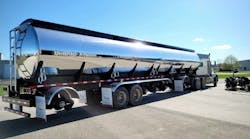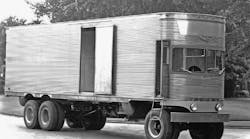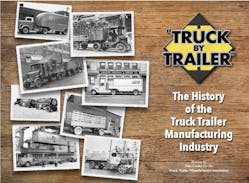If you’re a Trailer-Body Builders reader, then the chances are good you’ll be interested in a new book by a long-time veteran of the business. Truck by Trailer: The History of the Truck Trailer Manufacturing Industry is being billed as the first book to recognize the truck trailer as a unique transportation vehicle.
Written by John L. Conley—who spent 40 years with the trucking industry, including as editor of Modern Bulk Transporter magazine and with the trade association National Tank Truck Carriers Inc.—the book highlights the importance of the truck trailer as part of the celebration of the 75th Anniversary of the Truck Trailer Manufacturer’s Association.
After all, as the book details, the introduction of the truck trailer in the early 1900s revolutionized materials distribution much as had the first steamboats, railroad cars, airplanes, trucks, and intermodal shipping containers. And some of the same type of operational and regulatory challenges that faced trailer builders a century ago remain today.
But trailers proved their value during two world wars and those wartime experiences led to engineering and manufacturing advancements that long benefited commercial users. While methods and materials of trailer construction to serve expanding markets have changed over the years, the principle of providing the economy with a versatile and dependable tool for moving materials has remained unchanged.
Catch up on the complete history of the truck trailer industry by ordering Conley's book from the TTMA Online Store.










